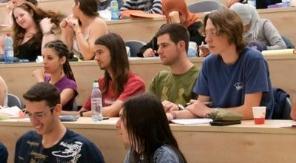Our nonacademic education council
Moreover, while the Council for Higher Education is cracking the whip when it comes to the department at Ben-Gurion, it is lenient toward Bar-Ilan University's Political Science Department, where experts from abroad also found significant problems.
Education Minister Gideon Sa'ar has bent the educational system to his political leanings - from kindergarten, where children learn the national anthem by rote, to visits by older children to Hebron. Sa'ar, who also serves as chairman of the Council for Higher Education, has decided to weed out of the academic world influences not to his taste. That's the line connecting the decision to turn the academic center in Ariel into a university and close Ben-Gurion University's Department of Politics and Government.
The closing of the department can still be prevented at the next meeting of the entire council, which will be required to approve the subcommittee's decision. In that meeting it will become clear whether the council has become a tool to punish critical lecturers and strike fear into the academic world, or whether it will remember its original purpose - to develop higher education and to refrain from intervention.
Haaretz Editorial

